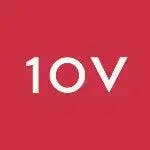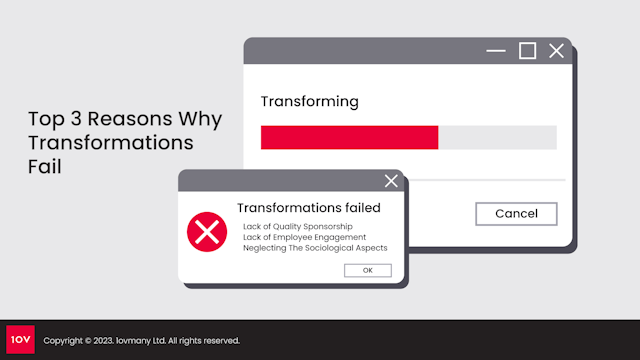Top 3 Reasons Why Transformations Fail
70% of transformations fail to achieve their goals. So why is it that so many organisational transformations have such a poor rate of success? Our consultancy team have identified the top 3 reasons why transformations fail.
3 November 2023

Transformation initiatives within organisations are crucial for instigating positive change, improving efficiency, and fostering growth. However, despite meticulous planning and well-intentioned efforts, these transformations often fall short of expectations. The reasons behind these failures are multifaceted, but a closer examination reveals recurring themes that significantly impact the outcome.
Using examples from our Consultancy Team’s collective years of experience in and around transformation initiatives, we’ve identified the top 3 reasons why transformations fail:
1. Lack of Quality Sponsorship
The success of transformations relies heavily on the support and guidance offered by sponsors, who hold significant influence within the organisation and possess a deep understanding of the intricacies of the change process.
In instances where sponsorship lacks quality, it often translates into a lack of clear direction and commitment across the business. Weak sponsors will struggle to effectively convey the purpose and benefits of the transformation, leading to confusion and resistance among employees.
This situation can give rise to conflicting priorities, with different departments or individuals within the organisation pursuing divergent agendas. Such discord undermines the cohesive implementation of transformation efforts. From our experience, these scenarios make it challenging for employees to align their actions with transformation goals, hindering progress and ultimately resulting in the failure of the initiative.
2. Lack of Employee Engagement
A fundamental error we observe in transformation initiatives is the failure to effectively engage with employees. The potential of employees to either accelerate the change or completely derail a transformation should not be underestimated.
Many transformations adopt a superficial, top-down approach, lacking depth and inclusivity. They often prioritise ticking checkboxes rather than genuinely connecting with their workforce.
In such scenarios, employees tend to perceive the transformation efforts as ‘imposed changes’ rather than necessary improvements designed to benefit them and their work. This lack of authentic involvement leads to a lack of ownership and commitment from the employees' side.
Without transparently communicating the rationale behind the change and involving employees in decision-making processes, they are far less likely to embrace the transformation. Consequently, there is a significant likelihood of encountering resistance, disengagement, and even active sabotage, ultimately resulting in the failure of the transformation initiative.
3. Neglecting The Sociological Aspects
Organisations are intricate networks of social interactions, beliefs, and values, extending beyond mere structures. Despite these elements being integral to a business’s culture, large consultancy playbooks often overlook the sociological aspects within organisations, significantly hindering transformation efforts.
 Organisational Sociology | 1ovmany
Organisational Sociology | 1ovmany
The prevailing mindset and organisational culture play a crucial role in shaping how employees perceive and react to change. If a transformation initiative does not align with the existing mindset or challenges deeply ingrained cultural norms, it is likely to encounter strong resistance.
Comprehending these sociological aspects requires a deep exploration of the organisational fabric. It involves recognising and honouring existing traditions and values while simultaneously introducing changes.
The goal is to make employees feel like active participants in the change rather than mere recipients of it. Although this might seem trivial, even the most well-designed transformation strategies can falter if they fail to garner the acceptance and momentum necessary for sustainable change.
Address the 3 reasons why transformations fail
Successful transformations demand more than just strategic planning and implementation. Quality sponsorship, genuine employee engagement, and a profound understanding of sociological factors are indispensable to ensuring a successful transformation initiative.
In addressing these aspects, organisations can navigate the complexities of change and increase their chances of executing purposeful and sustainable transformation.
We offer more comprehensive insights into the Components of Successful Transformation in our recently published guide, which you can read here.

About the author
1ovmany Communications Team
We help organisations reach their full potential through continuous and sustainable transformation in customer delivery and product excellence






































